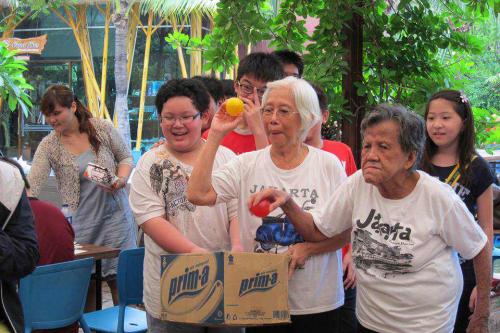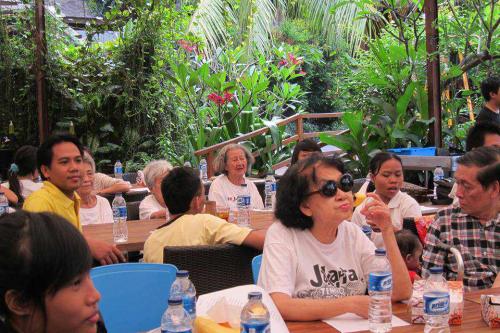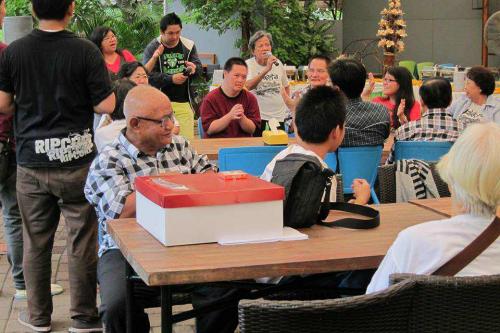
|
||||||||||
|
|
||||||||||
|
||||||||||||||||||||||||||||||||||||||||||||||||
|
||||||||||||||||||||||||||||||||||||||||||||||||
|
Respect for Self-determination
So the care of a non self-sufficient often falls upon the shoulders of someone who could himself ask for help.
Many elderly have been able to stay at home in the last few years and to re-insert themselves fully in a social context. Since 1988 the numbers have reached 12,000. But this effort is conducted everywhere the Community has begun to build a friendship with the elderly, When they are not able to return or stay in their own home, an alternative to a large institution is an hospitalisation in smaller and family type structures, as for example family homes or small institutes, taking into consideration the elderly’s preference for a place nearby the neighbourhood of origin or that of relatives.
In the majority of the cases followed through this telephone assistance, it is possible to launch a network action between facilities and the elderly or between facilities and families, offer a concrete help in organising daily life, integrate public and private assistance, transform the request for hospitalisation into an alternative solution that is more acceptable for both the elderly and his family. This last year, for example in Rome alone, the Community received 860 requests of this kind and more than half were resolved with a permanent stay in the elderly’s home. In order to favour this option it is important to co-ordinate a network of all available resources that goes from the assistance at home offered by the Municipality to the services of home assistance offered by hospital personnel (nurses, physiotherapists, etc.…); from a neighbour to a grocer who can bring food at home, from friends who can come and visit to a telephone monitoring equipped with security systems, as well as requests of economic assistance which local organisations grant to shut-ins. Our service has a catalyst function which without this network system it would be impossible for the elderly to obtain. On the other hand many are willing to help the elderly but they do not know how to go about it.
The help offered to the elderly to stay in their own homes carried out by the Community since 1988 represents a service to prevent hospitalisation. It wants to respond to those problems for the elderly like: old age, a reduced level of autonomy, multi-pathological situations, family conflicts, economic poverty, which lead to a high risk of hospitalisation in geriatric structures. The lack of services in a determined territory, like assistance at home, and reduced social and economic resources for many elderly make their life at their home often difficult when invalidity, a non self-sufficient status for physical and psychological reasons sets in. For many the only solution is hospitalisation in an institute. To help the elderly stay in their own home, even when energy declines, is a fundamental objective of the Community. For this reason a service has been installed that records requests to the Community on the part of elderly, family members as well as doctors, hospitals and social services. These requests generally ask for solutions of assistance at home. From the experience matured within the Community regarding the elderly the possibility has emerged of preventing hospitalisation altogether through personalised programs that link up the social, physical and economic resources available at the advantage of the elderly person, thus creating a concrete synergy, an alternative to institutionalisation. It is often the lack of different possibilities, information or co-ordination as well as the lack of a direct effort to block resources already available that leads to hospitalisation. In fact, in many situations even the simplest proposal requiring minimal help leads the elderly and the relatives to decide for a solution different from that of an institution. |
Menu
ALSO READ
|
|||||||||||||||||||||||||||||||||||||||||||||||


 Often the family members do not know how to manage the situation of a non self-sufficient elderly at home especially when this condition follows a tragic event (falls and fractures, stroke, etc.……). Often one does not know where to turn, what kind of support to ask for, what services are available locally. It is necessary to have a reference point for the elderly and his relatives guiding decisions by offering counsel and information. We must recall in this regard that very often the family of the elderly is made up of other elderly. Close to a man 90 years old we often find a partner of old age and a son over 60.
Often the family members do not know how to manage the situation of a non self-sufficient elderly at home especially when this condition follows a tragic event (falls and fractures, stroke, etc.……). Often one does not know where to turn, what kind of support to ask for, what services are available locally. It is necessary to have a reference point for the elderly and his relatives guiding decisions by offering counsel and information. We must recall in this regard that very often the family of the elderly is made up of other elderly. Close to a man 90 years old we often find a partner of old age and a son over 60.






